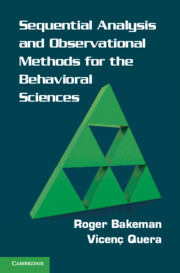Book contents
- Frontmatter
- Contents
- Figures
- Preface
- 1 Introduction to Observational Methods
- 2 Coding Schemes and Observational Measurement
- 3 Recording Observational Data
- 4 Representing Observational Data
- 5 Observer Agreement and Cohen’s Kappa
- 6 Kappas for Point-by-Point Agreement
- 7 The Intraclass Correlation Coefficient (ICC) for Summary Measures
- 8 Summary Statistics for Individual Codes
- 9 Cell and Summary Statistics for Contingency Tables
- 10 Preparing for Sequential and Other Analyses
- 11 Time-Window and Log-Linear Sequential Analysis
- 12 Recurrence Analysis and Permutation Tests
- Epilogue
- Appendix A Expected Values for Kappa Comparing Two Observers
- Appendix B Expected Values for Kappa Comparing with a Gold Standard
- References
- Index
1 - Introduction to Observational Methods
Published online by Cambridge University Press: 05 June 2012
- Frontmatter
- Contents
- Figures
- Preface
- 1 Introduction to Observational Methods
- 2 Coding Schemes and Observational Measurement
- 3 Recording Observational Data
- 4 Representing Observational Data
- 5 Observer Agreement and Cohen’s Kappa
- 6 Kappas for Point-by-Point Agreement
- 7 The Intraclass Correlation Coefficient (ICC) for Summary Measures
- 8 Summary Statistics for Individual Codes
- 9 Cell and Summary Statistics for Contingency Tables
- 10 Preparing for Sequential and Other Analyses
- 11 Time-Window and Log-Linear Sequential Analysis
- 12 Recurrence Analysis and Permutation Tests
- Epilogue
- Appendix A Expected Values for Kappa Comparing Two Observers
- Appendix B Expected Values for Kappa Comparing with a Gold Standard
- References
- Index
Summary
Observing behavior – the central concern of this book – is an ancient human endeavor without which even our survival could become problematic. What will the beast we hope to stalk, kill, and bring back to the tribe do next? Is that attractive and suitable mate open to my advances? Is that child in trouble and in need of our help?
Not all questions modern researchers pose will be as dramatic as these, and as behavioral scientists search for answers, self-conscious, systematic observational methods will come to supplant raw observation. But what exactly do we mean by observational methods? A definition is in order. In an expansive vein, the eighteenth-century historian William Douglass wrote, “As an historian, every thing is in my province” (1760, p. 230). Similarly, following the nineteenth-century physiologist Claude Bernard (1865/1927), the present-day behavioral scientist could say: Everything I know and do begins with observation. I observe and describe the gait of the horse. I observe and record the infant’s weight. I observe whether my participants check strongly agree, simply agree, or some other choice on a questionnaire.
Information
- Type
- Chapter
- Information
- Publisher: Cambridge University PressPrint publication year: 2011
